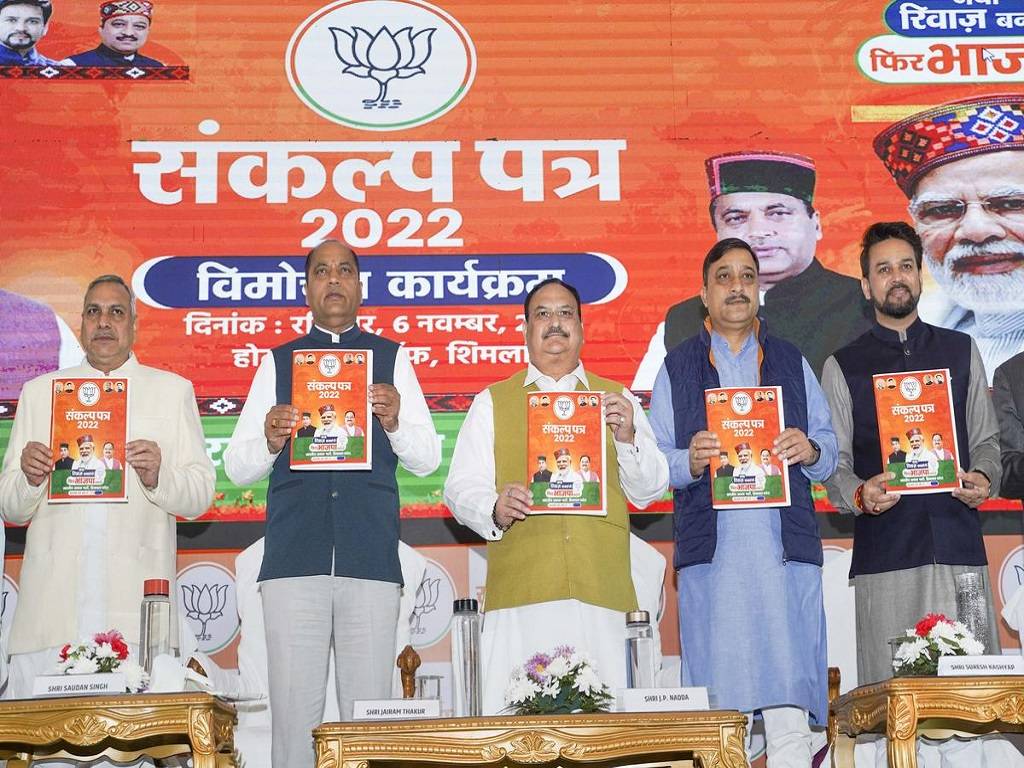
The BJP manifesto included a promise of a uniform civil code (UCC), 33% female employment preference, new educational institutions, and special considerations for different groups.
With a separate manifesto for women, a voting category where policies like free grains, cooking gas connections, and toilets have generated favorable responses for the BJP in various polls, the "Sankalp Patra" was underpinned by a mix of Hindutva, development, and welfare pledges.
Nadda promised the creation of 8 lakh jobs, including government jobs, cycles for female students in grades six to twelve, scooters for girls pursuing higher education, and five new medical colleges if his party retained power with less than a week until the assembly elections in his home state on November 12.
In order to stop their "illegal" use, the next BJP government will also mandate a survey of Waqf properties, he stated.
Nadda said in the BJP's "Sankalp Patra" that if the party is elected to power, UCC will be implemented in Himachal Pradesh and that a committee will be constituted to supervise it.
He emphasized that there is a narrow line between empowerment and allurement and that his party's perks cannot be referred to as freebies.
While the BJP is for the empowerment of different segments of society, it is against allurements, he said, adding it has taken a similar view in its response to the Election Commission in the debate on freebies, considered a drain on the exchequer for getting votes and spurned as “revdi” by Modi.
In response to a question, Nadda criticized the Saturday-released Congress manifesto, which also included similar sops promises, saying it lacked both vision and direction.
In addition, he rejected any attempt to compare the Congress and the BJP manifestos, claiming that the opposition party had made exaggerated and populist pledges that it had no intention of delivering on.
Additionally, he asserted that their governments had failed to fulfill pledges made in Rajasthan and Chhattisgarh in 2017, notably those related to jobs.
Party leader Mangal Pandey responded to a question regarding the BJP's position on the old pension plan (OPS), which Congress has pledged to revive. He said the state government has established a committee and will be guided by its report on the matter.
In the small hill state where present and former government employees make up a significant vote bank, the OPS issue has acquired traction.
In addition to the Hindutva element and Modi's appeal, which seems to resonate beyond people's complaints with basic issues, the BJP intends to offset it with its own beliefs.
Nadda expressed optimism that by electing the BJP once more, voters will break the pattern of the last few decades of voting out the party in power.
In its list of 11 "commitments," the BJP promised to connect all villages with roads, give farmers an additional Rs 3,000 on top of the Rs 6,000 they receive annually under a central government program, and invest Rs 12,000 crore over the course of the next ten years in the construction of transportation and physical infrastructure around temples.
Additionally, it promised to eliminate all pay inequalities for government employees and to relieve farmers of the GST on apple packaging. It also committed to investing Rs 900 crore to support start-up businesses.
Three free LPG cylinders for low-income homes and increased financial support for married women from low-income families are two of the eleven promises stated in the manifesto for women.
















